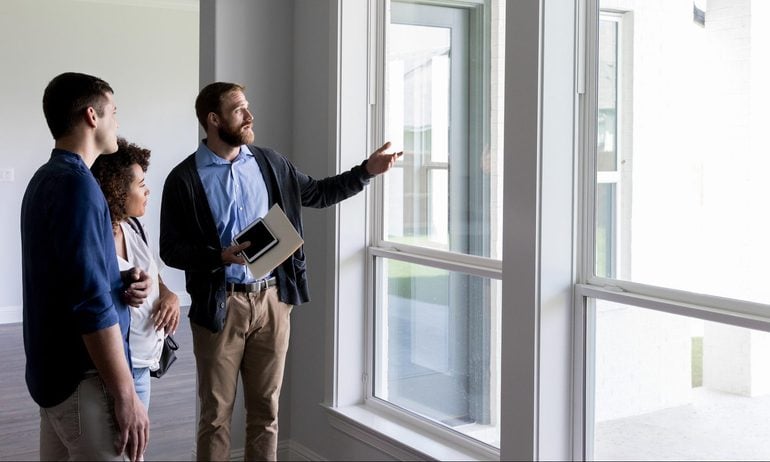How Long Does It Take to Buy a House?

Some or all of the mortgage lenders featured on our site are advertising partners of NerdWallet, but this does not influence our evaluations, lender star ratings or the order in which lenders are listed on the page. Our opinions are our own. Here is a list of our partners.
Buying a home generally takes at least a few months. From the first credit check to closing, there are many steps in the journey to homeownership, and no one can predict exactly how long the process will last for you. Variables that are out of your control (like your local housing market) and under your control (like your financial readiness) will play roles. Here's how long each step might take, from start to finish.
Getting your finances in order: Weeks to years
If, like most people, you plan to buy your home with a mortgage, knowing how much house you can afford is one of the first steps. Affordability depends on your income, debt and funds available for a down payment. This step allows for so much time variation because it might include:
Checking your credit scores and credit reports.
Building your credit and paying down debt, if necessary.
Creating a budget that covers the upfront and recurring costs of homeownership.
Setting a price range based on that budget for your house hunt.
Gathering the paperwork you’ll need for a mortgage.
Making a plan and saving for your down payment.
Some of these steps, like checking your credit reports and finding documents, could take hours. But others could take much longer — especially saving for a down payment, which may take years. In 2024, the median down payment for first-time home buyers was 9%, according to the National Association of Realtors. And that was the highest percentage it's been since 1997.
You don't need a 20% down payment to buy a home. That threshold only applies to avoiding private mortgage insurance on conventional loans. Plus, saving that much could substantially extend your homebuying timeline. In December 2024, the median price for an existing home was just over $400,000, per the NAR. Say you can afford to set aside $500 a month toward a down payment on a $400,000 home. To amass a 9% down payment of $36,000 would take six years. To reach a 3% down payment of $12,000 (3% is the lowest required down payment for a conventional loan) would take two years.
Want to speed up that timeline even further? You might look into loans that allow some borrowers to buy a house with no money down, like mortgages guaranteed by the U.S. Department of Veterans Affairs (VA) or U.S. Department of Agriculture (USDA). Local and state down payment assistance programs could also help you meet your down payment savings goals more quickly.
Making a cash offer allows you to skip many of these steps, since there's no mortgage. With a cash sale, closing could take as little as two weeks. But buying a house with cash isn't feasible for most buyers. In 2024, only 9% of first-time home buyers bought with cash, according to NAR statistics.
» MORE: How to save money for a house
Comparing lenders and getting preapproved: Up to two weeks
Plan to spend a week or two researching mortgage lenders. You want a lender that offers the type of loan you need and that will give you the best deal. Not every lender will offer you the same interest rate, so shopping around could save you thousands of dollars over the life of the loan.
Once you've got a few solid contenders, apply for mortgage preapproval from those lenders. A mortgage preapproval is a lender’s estimate of how much money you can borrow based on your income, credit score and debt. A preapproval includes the type of mortgage you’re approved for, the loan amount and other terms.
Getting preapproved with more than one lender helps you to compare loan offers so you can choose the best interest rate and terms. It can also give you a test drive of what working with that lender will be like.
Preapproval involves a hard inquiry on your credit report, but doing all your preapprovals within a 45-day period can minimize the impact. Credit bureaus recognize that you're shopping and only ding you once. Though it varies by lender, a mortgage preapproval typically takes several days to complete. Most preapprovals last for 90 days, but some might last 60 or 30 days. Staying in touch with your loan officer to keep your preapproval valid will help you avoid having to redo the credit check.
To speed up this step, outsource the research by working with a mortgage broker. A broker will find lenders that fit your needs and work with you through application and closing.
Home search: 10 weeks or more
Finding an agent: 1-2 weeks
Armed with a preapproval, you can begin your home search in earnest. You'll want to find a buyer's real estate agent who can help you find homes, set up viewings, negotiate with sellers on your behalf and generally provide support throughout the process. Talk with a few different agents to get a sense of their experience and personality, because you'll work fairly closely together through closing.
Viewing homes: 10 weeks
The number of homes for sale in your desired area and the time of year are among the factors that will affect the length of your housing search. Time spent looking for the right home also varies by buyer, budget and how they choose to search. (If you counted all the time you spent idly scrolling through real estate sites, you might add weeks or months to this stage!) Buyers typically searched for 10 weeks and toured a median of five homes, according to a 2024 NAR report.
Making an offer and negotiating: 3 days or more
Once you find the right house, the next step is to make an offer. With help from your real estate agent, you can negotiate specifics with the seller, including the price of the home and closing costs. It's also pretty common to set a deadline by which the seller needs to respond to your offer. Negotiations usually last a couple of days but can take longer if there is a bidding war or the seller makes a counteroffer.
Treasury Bills or HYSA: Which grows your down payment faster?
With yields that beat most high-yield savings accounts, the Atomic Treasury account can offer a smarter way to save. Plus, earned interest is exempt from state and local taxes.
Underwriting and closing: 30-60 days
The closing process begins after the seller accepts your offer and the house is under contract. The length of time varies depending on the type of loan and the time it takes for you to complete the steps listed below. Some of these steps will overlap, too. One way you can help it go faster: Be responsive to requests from your lender or broker. If the loan officer or underwriter asks for additional documentation, find and provide it ASAP.
Mortgage application: 1-3 days
Once you've got an offer accepted, you need to apply for a mortgage. You might know what lender you want to go with based on your preapprovals, or you could apply with more than one lender so you can compare their terms. Depending on what lender(s) you apply with, you might fill out the application entirely online or work with a loan officer over the phone or in person. (If you're working with a mortgage broker, they'll guide you through the application process.)
Once you have applied for a mortgage, the lender must send you a standard document called the Loan Estimate within three business days. This document will spell out all the terms of the loan, including what interest rate the lender is offering. If you've completed multiple home loan applications, this will probably be your decision point for choosing a lender.
Underwriting: At least a week
During underwriting, the mortgage lender confirms your loan eligibility by reviewing your finances in detail. Underwriting typically takes over a week to complete, but it can be done in as little as two to three days.
During this time, it’s wise to avoid changing jobs, opening lines of credit or paying bills late. Anything that changes your financial picture could make a lender reconsider your application.
» MORE: What not to do while you're waiting to close
Home appraisal: Up to three weeks
The property appraisal assesses the home’s value and is ordered by the lender. The point of the appraisal is to assure the lender that the property is worth the amount it’s lending you.
The appraisal of the actual home is usually completed in a few hours. However, it can take the appraiser a week or more to review comparable, recently sold homes in the area and create a report of the home’s assessed value.
If the appraisal comes in lower than expected, you might want to negotiate a lower price with the seller. If it's higher than your offer, you may need to find a way to cover the appraisal gap. Either can add more time to the appraisal step.
Home inspection: Seven to 10 days
Home inspections are not required but are recommended because they can uncover costly problems with the house. It's on you as the buyer to hire a home inspector and book the inspection, because the goal of this step is to reassure you about the purchase. (The lender is not involved with the home inspection and doesn't receive the results.)
Home buyers usually have seven to 10 days after an offer is accepted to conduct the inspection. While inspections can be performed in a few hours, you may have to wait up to 10 days for a report of the findings. If you need to negotiate with the seller about repairs or other issues uncovered during the inspection, that can slow down your timeline.
Title search: Two weeks or less
A title search determines who legally owns a property and whether there are any claims on it. The title search can take about two weeks; the length of time can depend on the type of property and transaction. Any issues with the title, such as a lien on the property, can add time to this step.
» MORE: Do you need title insurance?
Get homeowners insurance: One to three days
The mortgage lender will require that you get a homeowners insurance policy for the property in order for the sale to close. Getting quotes online for a straightforward policy might take only a couple of hours; working with an agent may take a few days. If you're in an area that's at a higher risk of natural disasters, you may want to start your insurance search soon after having your offer accepted, in case it takes you longer to find a policy. Another reason to start earlier: Some companies will give you a discount if you get the quote at least a week before you need the policy to take effect.
Review the closing disclosure: Three days before closing
At least three business days before your scheduled closing, your lender will send you the Closing Disclosure. This form is identical to the Loan Estimate you received at the beginning of this process, but instead of saying what different items might cost it will specify the actual costs. You can compare the two documents to see what costs went up or down. The Closing Disclosure will also specify exactly how much you will pay at closing.
Final preparation for closing: One to three days
You're so close! Make sure you've got everything you need to close on time. If you need to move the funds for covering your down payment and closing costs to a specific account, or if you need to get a cashier's check for the actual transaction, get that taken care of ahead of time.
On the day you close, you'll be able to do a final walkthrough of the property with your agent. If the seller agreed to make repairs, check that those are done; otherwise, you're looking to see that nothing's changed and you're ready to go through with the sale.
You'll also go through the closing itself, which usually takes an hour or so. You'll review the different loan documents, get everything signed and get the keys to your new home.


